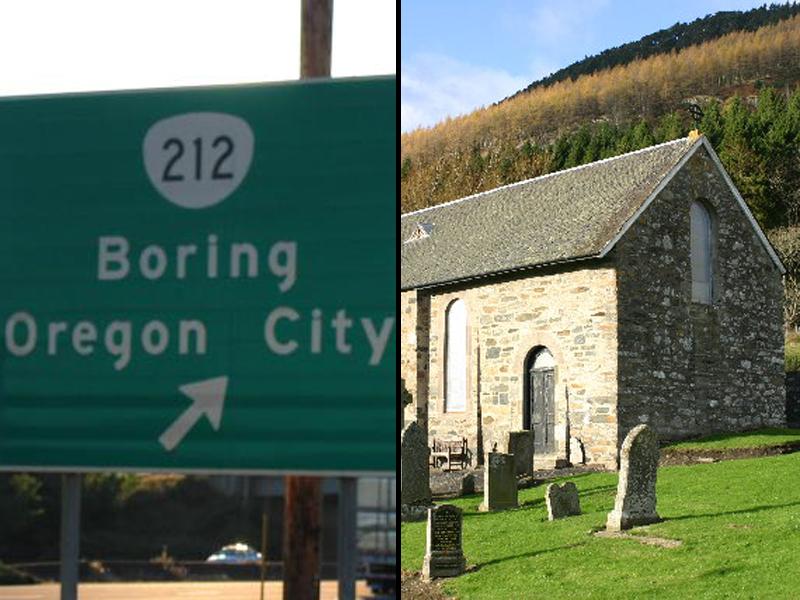Dull, Boring set to become sister cities
The towns of Dull, Scotland, and Boring, Ore., are set to become sister cities. (Photo illustration by Jonathan Kealing. Boring image, left, by Clipdude, Dull image, right, by Iain Macaulay, via Wikimedia Commons.)
Typically “sister cities” reach out to their foreign counterparts as a way to promote cultural or commercial ties. Toledo, Ohio, and Toledo, Spain, got the ball rolling back in 1931.
Ever since — cities have forged similar partnerships. Ames, Iowa, and Koshu, Japan, for example, or Galveston, Texas, and Cape Town, South Africa.
One of the latest sister city proposal that’s popped up involves a town in Oregon and a village in Scotland. It’s not clear the two places have much in common.
The Oregonian town has an elite training center for seeing-eye dogs, while the Scottish town has especially scenic bogs. But their names are linked: Boring, Ore., and a village in Dull, Scotland.
The list of sister cities in the world is a long one. According to Sister Cities International, more than 2,000 cities are partnered across more than 100 countries. Some are obscure. Louisville, Ky., has a sister city. Tamale, that’s the capital of a northern region of Ghana. Go figure.
Some cities even have multiple partners.
Emma Burtles is from Dull. She says a friend of hers who was bike touring in Oregon suggested the sister city idea to her in an email and she embraced the idea.
“I suggested it to the Dull Women’s Book Club and we all thought it was a fantastic idea,” she said.
Boring resident Jim Hart’s likes the idea as well.
“Life here is a bit dull so we need something to spice it up a little bit,” he said.
The plan is picking up momentum. Hart says it’s important to know the origin of the name of his Oregonian town.
“This area was named Boring because a person named Boring came here in 1856, and homesteaded,” he said. “I talked with one of the Borings who’s still living here, Bob Boring. And I asked him a couple of days ago, and he said his father told him Boring is not a condition, it’s a name.”
Fair enough. As for Dull’s story, Burtles says there’s a couple of theories. One is the name comes from an old Scottish word for meadow.
Dull may also refer to the leather straps used to carry a coffin. She says there’s a old story about the dulls snapping during an apparently lengthy funeral procession to an island cemetery.
“His body was being taken to Holy Island and the dulls as they were called, the straps that hold a a coffin up when you’re carrying it, broke here in Dull and his bearers decided that was a sign to bury him here and to create a monastery,” she said. “Personally I think they were probably a bit tired and didn’t really want to walk all the way to Holy Island.”
Lazy might have been another option, but they went with Dull.
Now with a sister city partnership in the offing, Hart said he looks forward to hosting some Dull visitors.
